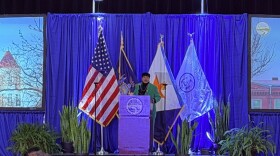A decades-old battle to protect the unmarked graves of Indigenous people has hit a new hurdle in New York state government.
The “Unmarked Burial Site Protection Act”—passed by the New York Senate and Assembly—would have established a process for dealing with the discovery of unmarked graves on construction sites. But as 2022 drew to a close, Gov. Kathy Hochul vetoed the measure.
Joe Heath is general counsel for the Onondaga Nation. He said for the Haudenosaunee people, hearing about the veto is emotional.
"You have to step back and think, 'What would I want done if these were my ancestors?'” Heath said. “And we have yet to encounter any culture that isn't very concerned that their ancestors not be dug up."
In her veto memo, Gov. Hochul wrote in part, “Once descendants or culturally-affiliated groups are identified, they would be given complete discretion over the disposition of the remains, including deciding to have the remains stay interred on the private property. Throughout this process, which does not have a specified end date or window, the property owners would have no authority over their own real property, and would be forced to accept decisions that impact their property…. Any process addressing the handling of unearthed human remains that also involves the private property of New Yorkers must appropriately protect both interests. This bill, as drafted, does not do so.”
Heath said New York is one of only four states that does not have a law outlining procedures for when burial sites are unearthed on private property during excavation. And he said it’s necessary to have a process in place.
“It just makes everyone’s agendas easier, and so, it would protect unmarked graves, and it would also govern what happens if either human remains or cultural items are inadvertently discovered,” he said.
Heath said the bill has been reintroduced and proponents have been speaking with the governor’s office to address concerns. He’s hopeful all parties will come to an agreement soon.
"We have to remember, this is Indian country. We should be more respectful of those who were here centuries ago. We can do this better, and I think we're beginning to get an understanding of that."








